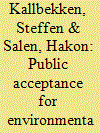|
|
|
Sort Order |
|
|
|
Items / Page
|
|
|
|
|
|
|
| Srl | Item |
| 1 |
ID:
088972


|
|
|
|
|
| Publication |
2009.
|
| Summary/Abstract |
This article implements a simple econometric approach to assess the effect of the environmental tax reforms introduced in Germany and the UK. Despite the very simple econometric approach adopted in this paper, in the case of the energy demand, our results do not differ markedly from those obtained from complicated multi-sectoral econometric models. In the case of the labour demand, our results differ from the estimates obtained from econometric models where the employment level is not directly influenced by the energy price. On the other hand, our results are more similar to those obtained from models where the level of employment is directly influenced by the energy price. Confirming the findings of Bosquet [2000. Environmental tax reform: does it work? A survey of the empirical evidence. Ecological Economics 34, 19-32] and OECD [2004. Environment and Employment: An Assessment Working Party on National Environmental Policy OECD, Paris], we conclude that environmental tax reforms can deliver substantial reductions in energy consumption while having small effects on the level of employment, effect which can be positive, depending on the size of the reduction in the labour costs and the value of cross-price elasticities.
|
|
|
|
|
|
|
|
|
|
|
|
|
|
|
|
| 2 |
ID:
160034


|
|
|
|
|
| Summary/Abstract |
This article attempts to document the status of environmental fiscal instruments (EFIs) so as to explore relevant international experiences on ecotaxes in the context of India and to examine India’s specificities in these taxes within a wider perspective of other fiscal measures. Environmental levies across 15 countries were reviewed and the countries categorised are into two groups: Annex II and Non-Annex I. The revenues from levies imposed in the countries were also analysed. The most common form of taxes in Annex II countries in the form of energy taxes, followed by transport taxes. For India, energy and transport taxes could prove to be vital types of ecotaxes for addressing issues of climate change. Pollution taxes are difficult to levy for administrative reasons, but resource taxes are imperative because of severe environmental problems associated with mining and related activities. The revenue generated from environmental taxes and charges for all Annex II countries hovered between 2 and 4 per cent of their respective GDPs, except for Canada and the United States of America, whereas for Non-Annex I nations, this ranged only between 0 and 1 per cent.
|
|
|
|
|
|
|
|
|
|
|
|
|
|
|
|
| 3 |
ID:
162935


|
|
|
|
|
| Summary/Abstract |
To investigate the efficacy and efficiency of environmental taxes, I analyze the rate at which taxes on motor gasoline are passed to consumers by estimating two cointegrating vector autoregression models for each of six states. For state models that specify the retail price of motor gasoline without taxes, exclusion tests suggest that taxes on motor gasoline are not passed to consumers on a one-for-one basis. For state models that specify the retail price of motor gasoline including taxes, results indicate that taxes are passed to wholesale prices in Florida and Massachusetts on a one-for-one basis and are passed to retail prices with a ‘mark-up’ in Florida, Massachusetts, New York, and Ohio, and are not fully passed through in Washington. State-specific rates of pass-through differ from results suggested by theory and fixed effects estimators, which may be biased by the presence of nonstationary data and the assumption that the rate of pass through is the same across states. Rates of pass through greater than one transfer $12.2 billion from consumers to retailers in FL, $2.3 billion in MA, and $19.2 billion in NY during the sample period, which represent 10.7%, 6.0%, and 23.9% of total expenditures on regular motor gasoline.
|
|
|
|
|
|
|
|
|
|
|
|
|
|
|
|
| 4 |
ID:
104979


|
|
|
|
|
| Publication |
2011.
|
| Summary/Abstract |
While strongly recommended by economists, it has often been politically difficult to impose taxes on externalities. There is a substantial literature on public attitudes towards environmental taxes. There has, however, been few comprehensive attempts to understand attitudes towards environmental taxes.
The main research question in this paper is which factors influence support for fuel taxation. We propose a model of attitudes towards fuel taxation, and test this model as well as more specific hypotheses, using data from a representative survey of the adult Norwegian population.
Our results suggest that support for fuel taxation is best predicted by beliefs about environmental consequences, followed by beliefs about consequences to others. Beliefs about consequences to self (self-interest) is the factor that explains the least variation in support for fuel taxation.
The academically interesting result that support cannot be well explained without capturing a broad range of motivational factors is also highly policy relevant. It implies that there is no magic formula for increasing public support for environmental taxes. There are, however, some issues which can be addressed: trust in how well the government spends the revenue, and the perception that taxation does very little to change behaviour and thus to reduce environmental problems.
|
|
|
|
|
|
|
|
|
|
|
|
|
|
|
|
|
|
|
|
|